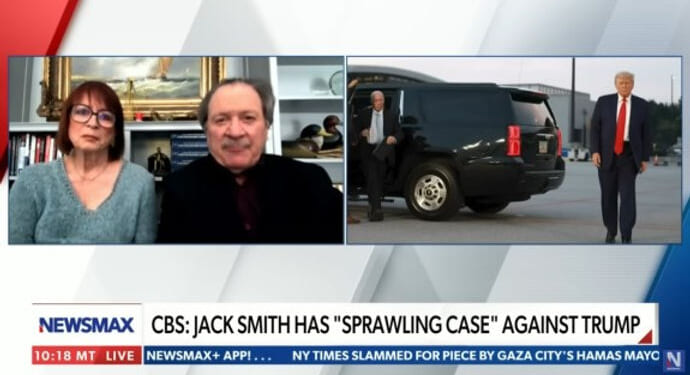By Joe diGenova and Victoria Toensing
It was no surprise that the DC Circuit Court of Appeals rejected former President Donald Trump’s appeal that he is immune from the conduct charged by Special Prosecutor Jack Smith in the District of Columbia federal trial court. Two of the three panel members were

Biden appointees and the third is a never-Trumper George H.W. Bush appointee Karen Henderson, who has held that a January 6 defendant could be imprisoned because of his mere presence in the Capitol although he was “neither violent nor destructive.”
The Trump opinion was as unsophisticated as it was disingenuous, ignoring underlying facts and citing irrelevant precedents. It is clear the court first decided to deny the appeal. It then twisted “precedents” to argue —duplicitously—they fit Trump’s conduct.
Two types of conduct were charged in the 45-page indictment: 1) Trump gave a speech on January 6 after which part of the attendees entered the U.S. Capital where some acted unlawfully and 2) that Trump “organized” persons in seven states to be alternate electors, which Smith describes as “fraudulent slates of electors.” The Circuit Court rushed to a faulty legal conclusion describing those facts as Trump being prosecuted for “conspiracy to overturn federal election results and unlawfully overstay his term.” Trump and Melania had packed their bags and were headed for Mar-a-Lago by the January 20, 2021 deadline, last I recall. All the charged conduct was done by a Presidential incumbent and candidate vigorously challenging elections results, much like Al Gore in 2000. (And like Hillary wished she could have done in 2016.)
The issue is whether making the January 6 speech or organizing alternate electors violated the law. Or to quote Supreme Court language, the test is whether such conduct was “within the outer perimeter” of presidential duties.
The Circuit Court ignored that test when it claimed Presidents could be indicted for conduct while President, citing two examples of Presidents violating the law while President: Richard Nixon and Bill Clinton. Neither covering up an illegal burglary nor lying under oath about having sex in the oval office are “within the outer perimeters” of presidential duties.
In citing irrelevant precedents, the Court also claimed the judiciary has the authority to curb Presidential conduct, such as when the Supreme Court prohibited Harry Truman from seizing the steel mills. So what? Truman was not indicted. Nor were any other of the Presidents in the Court’s examples.
The Circuit Court asserted it has the “authority to determine whether [the President] has acted within the law.” But it provided no test for deciding whether a speech on the ellipse or organizing alternate electors –as John Kennedy did in Hawaii in 1960—was criminal conduct. No criminal law was cited.
One problem with Trump’s position was that his counsel went out over his legal skis by arguing that an ex-President can only be indicted if he is first impeached by the House and convicted by the Senate for the conduct- at- issue. No. Impeachment is a political, not a legal, process. So, impeachment has no relevance to a subsequent criminal case. Sadly, such argument gave the biased panel grist for inane hypotheticals, such as if “the President ordered SEAL Team Six to assassinate his political opponent” can he be indicted? The pathetic response was that only if he were first impeached and convicted. It should have been, “Yes, Your Honor, just like if a President ordered his Attorney General to indict his political opponent.”
Merrick Garland’s DOJ unconstitutionally and in violation of DOJ’s rules authorized a search warrant for all Victoria’s client information, costing Joe and Victoria $500,000 to protect their clients’ privileged information.
Please read more and donate here:
-
Joe Biden Justice Department
-
Special Counsel Jack Smith
-
Foreign Agents Registration Act (FARA)
-
Prosecutor General Yuriy Lutsenko












